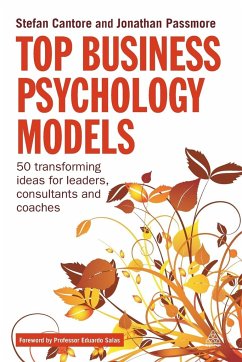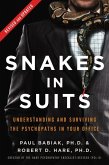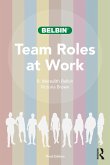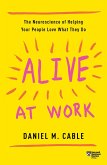- Broschiertes Buch
- Merkliste
- Auf die Merkliste
- Bewerten Bewerten
- Teilen
- Produkt teilen
- Produkterinnerung
- Produkterinnerung
A quick, accessible overview to the fundamental theories and models of positive psychology in business.
Andere Kunden interessierten sich auch für
![Snakes in Suits Snakes in Suits]() Dr. Paul BabiakSnakes in Suits17,99 €
Dr. Paul BabiakSnakes in Suits17,99 €![Team Roles at Work Team Roles at Work]() R. Meredith BelbinTeam Roles at Work180,99 €
R. Meredith BelbinTeam Roles at Work180,99 €![Team Roles at Work Team Roles at Work]() R. Meredith BelbinTeam Roles at Work34,99 €
R. Meredith BelbinTeam Roles at Work34,99 €![Psychology and Work Today Psychology and Work Today]() Carrie A. BulgerPsychology and Work Today70,99 €
Carrie A. BulgerPsychology and Work Today70,99 €![Group and Team Coaching Group and Team Coaching]() Christine ThorntonGroup and Team Coaching22,99 €
Christine ThorntonGroup and Team Coaching22,99 €![Group and Team Coaching Group and Team Coaching]() Christine ThorntonGroup and Team Coaching44,99 €
Christine ThorntonGroup and Team Coaching44,99 €![Alive at Work Alive at Work]() Daniel M. CableAlive at Work10,99 €
Daniel M. CableAlive at Work10,99 €-
-
-
A quick, accessible overview to the fundamental theories and models of positive psychology in business.
Hinweis: Dieser Artikel kann nur an eine deutsche Lieferadresse ausgeliefert werden.
Hinweis: Dieser Artikel kann nur an eine deutsche Lieferadresse ausgeliefert werden.
Produktdetails
- Produktdetails
- Verlag: Kogan Page Ltd
- Seitenzahl: 224
- Erscheinungstermin: 3. Juli 2012
- Englisch
- Abmessung: 234mm x 156mm x 12mm
- Gewicht: 346g
- ISBN-13: 9780749464653
- ISBN-10: 0749464658
- Artikelnr.: 35301215
- Herstellerkennzeichnung
- Libri GmbH
- Europaallee 1
- 36244 Bad Hersfeld
- gpsr@libri.de
- Verlag: Kogan Page Ltd
- Seitenzahl: 224
- Erscheinungstermin: 3. Juli 2012
- Englisch
- Abmessung: 234mm x 156mm x 12mm
- Gewicht: 346g
- ISBN-13: 9780749464653
- ISBN-10: 0749464658
- Artikelnr.: 35301215
- Herstellerkennzeichnung
- Libri GmbH
- Europaallee 1
- 36244 Bad Hersfeld
- gpsr@libri.de
Jonathan Passmore is an occupational psychologist and a coaching supervisor. He has wide business consulting experience, having worked for PricewaterhouseCoopers, IBM Business Consulting and OPM, and as a chief executive and company chairman in the sports leisure sector. He is based at the School of Psychology, University of East London, and is Director for the Coaching and Coaching Psychology programs. He is the author of several books and editor of Excellence in Coaching and Psychometrics in Coaching. Stefan Cantore is a consultant in the areas of leadership and management development, with a focus on teaching leaders and organizations to use conversation as a process for change. He is also the co-author of Appreciative Inquiry for Change Management with Jonathan Passmore and Sarah Lewis (published by Kogan Page).
Acknowledgements
About the authors
Foreword by Professor Eduardo Salas
Introduction
Part One: The individual at work
01 What makes people do things?
Maslow's hierarchy of needs
02 How can we become more engaged with work?
Flow
03 How can people develop their self-awareness?
Mindfulness
04 Helping others to set goals
The GROW model
05 How can people learn to become more optimistic?
Learned optimism
06 Why did they do that?
Attribution theory
07 How can we make sense of who we are?
Personality trait and type theory
08 How does psychological testing work?
Psychometrics
09 How do we think about others thinking?
Theory of mind and emotional intelligence
10 How can we manage our negative thinking?
Cognitive behavioural model
11 How can job performance be accurately and fairly assessed?
Behaviourally anchored rating scales (BARS)
12 How do people cope with change?
Phases of change models
13 How do we understand different types of people?
Myers-Briggs Type Indicator (MBTI)
14 How do we know if someone is telling us a lie?
Facial displays
15 How can people understand and build on their strengths?
Values in Action Inventory of Strengths (VIA-IS)
16 What can employers do to improve the mood and commitment of their staff?
Psychological capital
17 How to help people cope well with change
Three phases of transition
18 Where does motivation come from?
Self-determination theory
19 How can we rely on psychometric tests?
Reliability and validity
20 How can people change their behaviours?
Transtheoretical Model of Change
21 How do people positively handle trauma?
Post-traumatic growth theory
22 How can people develop their capacity to cope with adversity?
Resilience 91
Part Two: Team effort
23 Do people work harder if you give them more attention?
The Hawthorne effect
24 Do the assumptions that managers have about people affect how they do
their work?
Theory X and Theory Y
25 Do groups always make the best decisions?
Groupthink
26 What behaviours improve team performance?
Belbin team roles
27 Does an attractive communicator influence our decision making?
Attractiveness theory
28 How to use goal setting to enhance performance
Goal-setting theory
29 Why do people obey authority figures even when they are being asked to
do something they know is wrong?
Obedience to authority theory
30 How can you select the best candidate at an interview?
Behavioural interviewing
31 How do people make up our minds?
Majority and minority influence
32 How can we positively help people and teams change?
The Skilled Helper Model
33 How does shift work impact on how well people do their work?
Circadian rhythms and performance at work
34 How do groups develop to become effective?
Tuckman's group development
35 How can you ensure everyone makes a fair contribution to team goals?
Social loafing theory
36 How do you get good outcomes for both sides in a negotiation?
Best alternative to a negotiated agreement (BATNA)
37 How do I make decisions in a complex world?
Cynefin complexity model
38 How can we specify the behaviours required to perform a task well?
Critical incident technique
Part Three: Organizations
39 How useful are positive emotions?
Broaden-and-build theory of positive emotions
40 What can organizations do to transform the way they think and act?
Appreciative inquiry
41 How do people's expectations of their employers affect the way they
work?
Psychological contract
42 What can you do to make training a good investment?
Social learning theory
43 How do I take account of the forces for and against change?
Force field analysis
44 How can you make a workplace fair?
Organizational justice
45 How do you tackle difficult people at work?
Managing difficult people
46 How do people really make decisions?
The bounded rationality model of decision making
47 How can good conversations change organizations?
Conversational approaches to change
48 How can metaphors help managers change their organizations?
Organizational metaphors
49 How can you make work less stressful?
The vitamin model of stress
50 What can we do to make our writing more readable?
FOG Index of Readability
About the authors
Foreword by Professor Eduardo Salas
Introduction
Part One: The individual at work
01 What makes people do things?
Maslow's hierarchy of needs
02 How can we become more engaged with work?
Flow
03 How can people develop their self-awareness?
Mindfulness
04 Helping others to set goals
The GROW model
05 How can people learn to become more optimistic?
Learned optimism
06 Why did they do that?
Attribution theory
07 How can we make sense of who we are?
Personality trait and type theory
08 How does psychological testing work?
Psychometrics
09 How do we think about others thinking?
Theory of mind and emotional intelligence
10 How can we manage our negative thinking?
Cognitive behavioural model
11 How can job performance be accurately and fairly assessed?
Behaviourally anchored rating scales (BARS)
12 How do people cope with change?
Phases of change models
13 How do we understand different types of people?
Myers-Briggs Type Indicator (MBTI)
14 How do we know if someone is telling us a lie?
Facial displays
15 How can people understand and build on their strengths?
Values in Action Inventory of Strengths (VIA-IS)
16 What can employers do to improve the mood and commitment of their staff?
Psychological capital
17 How to help people cope well with change
Three phases of transition
18 Where does motivation come from?
Self-determination theory
19 How can we rely on psychometric tests?
Reliability and validity
20 How can people change their behaviours?
Transtheoretical Model of Change
21 How do people positively handle trauma?
Post-traumatic growth theory
22 How can people develop their capacity to cope with adversity?
Resilience 91
Part Two: Team effort
23 Do people work harder if you give them more attention?
The Hawthorne effect
24 Do the assumptions that managers have about people affect how they do
their work?
Theory X and Theory Y
25 Do groups always make the best decisions?
Groupthink
26 What behaviours improve team performance?
Belbin team roles
27 Does an attractive communicator influence our decision making?
Attractiveness theory
28 How to use goal setting to enhance performance
Goal-setting theory
29 Why do people obey authority figures even when they are being asked to
do something they know is wrong?
Obedience to authority theory
30 How can you select the best candidate at an interview?
Behavioural interviewing
31 How do people make up our minds?
Majority and minority influence
32 How can we positively help people and teams change?
The Skilled Helper Model
33 How does shift work impact on how well people do their work?
Circadian rhythms and performance at work
34 How do groups develop to become effective?
Tuckman's group development
35 How can you ensure everyone makes a fair contribution to team goals?
Social loafing theory
36 How do you get good outcomes for both sides in a negotiation?
Best alternative to a negotiated agreement (BATNA)
37 How do I make decisions in a complex world?
Cynefin complexity model
38 How can we specify the behaviours required to perform a task well?
Critical incident technique
Part Three: Organizations
39 How useful are positive emotions?
Broaden-and-build theory of positive emotions
40 What can organizations do to transform the way they think and act?
Appreciative inquiry
41 How do people's expectations of their employers affect the way they
work?
Psychological contract
42 What can you do to make training a good investment?
Social learning theory
43 How do I take account of the forces for and against change?
Force field analysis
44 How can you make a workplace fair?
Organizational justice
45 How do you tackle difficult people at work?
Managing difficult people
46 How do people really make decisions?
The bounded rationality model of decision making
47 How can good conversations change organizations?
Conversational approaches to change
48 How can metaphors help managers change their organizations?
Organizational metaphors
49 How can you make work less stressful?
The vitamin model of stress
50 What can we do to make our writing more readable?
FOG Index of Readability
Acknowledgements
About the authors
Foreword by Professor Eduardo Salas
Introduction
Part One: The individual at work
01 What makes people do things?
Maslow's hierarchy of needs
02 How can we become more engaged with work?
Flow
03 How can people develop their self-awareness?
Mindfulness
04 Helping others to set goals
The GROW model
05 How can people learn to become more optimistic?
Learned optimism
06 Why did they do that?
Attribution theory
07 How can we make sense of who we are?
Personality trait and type theory
08 How does psychological testing work?
Psychometrics
09 How do we think about others thinking?
Theory of mind and emotional intelligence
10 How can we manage our negative thinking?
Cognitive behavioural model
11 How can job performance be accurately and fairly assessed?
Behaviourally anchored rating scales (BARS)
12 How do people cope with change?
Phases of change models
13 How do we understand different types of people?
Myers-Briggs Type Indicator (MBTI)
14 How do we know if someone is telling us a lie?
Facial displays
15 How can people understand and build on their strengths?
Values in Action Inventory of Strengths (VIA-IS)
16 What can employers do to improve the mood and commitment of their staff?
Psychological capital
17 How to help people cope well with change
Three phases of transition
18 Where does motivation come from?
Self-determination theory
19 How can we rely on psychometric tests?
Reliability and validity
20 How can people change their behaviours?
Transtheoretical Model of Change
21 How do people positively handle trauma?
Post-traumatic growth theory
22 How can people develop their capacity to cope with adversity?
Resilience 91
Part Two: Team effort
23 Do people work harder if you give them more attention?
The Hawthorne effect
24 Do the assumptions that managers have about people affect how they do
their work?
Theory X and Theory Y
25 Do groups always make the best decisions?
Groupthink
26 What behaviours improve team performance?
Belbin team roles
27 Does an attractive communicator influence our decision making?
Attractiveness theory
28 How to use goal setting to enhance performance
Goal-setting theory
29 Why do people obey authority figures even when they are being asked to
do something they know is wrong?
Obedience to authority theory
30 How can you select the best candidate at an interview?
Behavioural interviewing
31 How do people make up our minds?
Majority and minority influence
32 How can we positively help people and teams change?
The Skilled Helper Model
33 How does shift work impact on how well people do their work?
Circadian rhythms and performance at work
34 How do groups develop to become effective?
Tuckman's group development
35 How can you ensure everyone makes a fair contribution to team goals?
Social loafing theory
36 How do you get good outcomes for both sides in a negotiation?
Best alternative to a negotiated agreement (BATNA)
37 How do I make decisions in a complex world?
Cynefin complexity model
38 How can we specify the behaviours required to perform a task well?
Critical incident technique
Part Three: Organizations
39 How useful are positive emotions?
Broaden-and-build theory of positive emotions
40 What can organizations do to transform the way they think and act?
Appreciative inquiry
41 How do people's expectations of their employers affect the way they
work?
Psychological contract
42 What can you do to make training a good investment?
Social learning theory
43 How do I take account of the forces for and against change?
Force field analysis
44 How can you make a workplace fair?
Organizational justice
45 How do you tackle difficult people at work?
Managing difficult people
46 How do people really make decisions?
The bounded rationality model of decision making
47 How can good conversations change organizations?
Conversational approaches to change
48 How can metaphors help managers change their organizations?
Organizational metaphors
49 How can you make work less stressful?
The vitamin model of stress
50 What can we do to make our writing more readable?
FOG Index of Readability
About the authors
Foreword by Professor Eduardo Salas
Introduction
Part One: The individual at work
01 What makes people do things?
Maslow's hierarchy of needs
02 How can we become more engaged with work?
Flow
03 How can people develop their self-awareness?
Mindfulness
04 Helping others to set goals
The GROW model
05 How can people learn to become more optimistic?
Learned optimism
06 Why did they do that?
Attribution theory
07 How can we make sense of who we are?
Personality trait and type theory
08 How does psychological testing work?
Psychometrics
09 How do we think about others thinking?
Theory of mind and emotional intelligence
10 How can we manage our negative thinking?
Cognitive behavioural model
11 How can job performance be accurately and fairly assessed?
Behaviourally anchored rating scales (BARS)
12 How do people cope with change?
Phases of change models
13 How do we understand different types of people?
Myers-Briggs Type Indicator (MBTI)
14 How do we know if someone is telling us a lie?
Facial displays
15 How can people understand and build on their strengths?
Values in Action Inventory of Strengths (VIA-IS)
16 What can employers do to improve the mood and commitment of their staff?
Psychological capital
17 How to help people cope well with change
Three phases of transition
18 Where does motivation come from?
Self-determination theory
19 How can we rely on psychometric tests?
Reliability and validity
20 How can people change their behaviours?
Transtheoretical Model of Change
21 How do people positively handle trauma?
Post-traumatic growth theory
22 How can people develop their capacity to cope with adversity?
Resilience 91
Part Two: Team effort
23 Do people work harder if you give them more attention?
The Hawthorne effect
24 Do the assumptions that managers have about people affect how they do
their work?
Theory X and Theory Y
25 Do groups always make the best decisions?
Groupthink
26 What behaviours improve team performance?
Belbin team roles
27 Does an attractive communicator influence our decision making?
Attractiveness theory
28 How to use goal setting to enhance performance
Goal-setting theory
29 Why do people obey authority figures even when they are being asked to
do something they know is wrong?
Obedience to authority theory
30 How can you select the best candidate at an interview?
Behavioural interviewing
31 How do people make up our minds?
Majority and minority influence
32 How can we positively help people and teams change?
The Skilled Helper Model
33 How does shift work impact on how well people do their work?
Circadian rhythms and performance at work
34 How do groups develop to become effective?
Tuckman's group development
35 How can you ensure everyone makes a fair contribution to team goals?
Social loafing theory
36 How do you get good outcomes for both sides in a negotiation?
Best alternative to a negotiated agreement (BATNA)
37 How do I make decisions in a complex world?
Cynefin complexity model
38 How can we specify the behaviours required to perform a task well?
Critical incident technique
Part Three: Organizations
39 How useful are positive emotions?
Broaden-and-build theory of positive emotions
40 What can organizations do to transform the way they think and act?
Appreciative inquiry
41 How do people's expectations of their employers affect the way they
work?
Psychological contract
42 What can you do to make training a good investment?
Social learning theory
43 How do I take account of the forces for and against change?
Force field analysis
44 How can you make a workplace fair?
Organizational justice
45 How do you tackle difficult people at work?
Managing difficult people
46 How do people really make decisions?
The bounded rationality model of decision making
47 How can good conversations change organizations?
Conversational approaches to change
48 How can metaphors help managers change their organizations?
Organizational metaphors
49 How can you make work less stressful?
The vitamin model of stress
50 What can we do to make our writing more readable?
FOG Index of Readability









